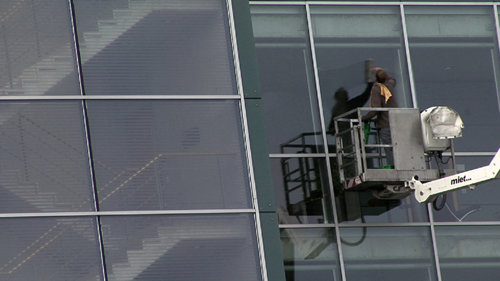Summertime;
dal 25/6/2009 al 11/9/2009
Segnalato da
Knut Asdam
Chen Shaoxiong
Jimmie Durham
Nina Fischer
Maroan el Sani
Cyprien Gaillard
Marine Hugonnier
Emre Huner
Aleksander Komarov
Mark Lewis
Sam Samore
Atelier Bow-Wow
Hou Hanru
25/6/2009
Summertime;
San Francisco Art Institute - SFAI, San Francisco
or, Close-ups on Places We've (Never) Been. Raising anew the question how certain forms of spatial organization- in particular, the utopic socioeconomic experiments of modernist architecture and design - have become so naturalized a force within the urban environment that they inform the very infrastructure of our identities, each of these artists foregrounds the social longing, the fractured intimacies, the circuitous displacements - in short, the anomie - engendered, within quite particular localities, by idealized and universalizing vocabularies for the configuration of site and space.

An exhibition of film and video works by Knut Åsdam, Chen Shaoxiong, Jimmie Durham, Nina Fischer & Maroan el Sani, Cyprien Gaillard, Marine Hugonnier, Emre Hüner, Aleksander Komarov, Mark Lewis, and Sam Samore
Installation by Atelier Bow-Wow
On Friday, 26 June 2009, the opening reception for
Summertime; or, Close-ups on Places We’ve (Never) Been—an exhibition of film and video
works by a roster of international artists, curated by SFAI’s director of Exhibitions and Public
Programs, Hou Hanru—will be held from 5:30 to 7:30 p.m. at the Walter and McBean Galleries
on SFAI’s 800 Chestnut Street campus.
Against the now-commonplace backdrop of an economic downward spiral whose sighted end
keeps proving to be another mirage, summertime comes—a redundant predetermined mythology
replete with its own cache of ready-made images. One such image, a stalwart in the Western
canonical lexicon, is the spatial metaphor “through” which abstract entities like summertime are
positioned so as to offer relief for—a “vacation” from—other abstract entities like global
economic repression. The promise built into the relief-inducing spatial metaphor is the very
promise inherent in the relooping mythology of summertime itself—distance, perspective, the
exchange of a messy recent past in which we remain multiply enmeshed for a balmy idyllic
present brimming with nostalgic fantasies about what summertime (never) was.
Raising anew the question how certain forms of spatial organization—in particular, the utopic
socioeconomic experiments of modernist architecture and design—have become so naturalized a
force within the urban environment that they inform the very infrastructure of our identities, each
of the artists in this exhibition—Knut Åsdam, Chen Shaoxiong, Jimmie Durham, Nina Fischer &
Maroan el Sani, Cyprien Gaillard, Marine Hugonnier, Emre Hüner, Aleksander Komarov, Mark
Lewis, and Sam Samore—foregrounds the anomie engendered, within quite particular localities,
by idealized and universalizing vocabularies for the configuration of site and space. Though
generated out of the diverse cultural and personal backgrounds of their makers and though
together demonstrating a manifold of filmic approaches and strategies, each video in its way
proposes at once a critique of and a new vision for the hypermodernist sky-, land-, or cityscapes
it provocatively evokes. In a word—indeed, in a coinage of Michel Foucault’s—what these
artists seek is that “other place” or “heterotopia” endlessly gone missing in the (sub)urban flux,
endlessly driven out of plain sight into hiding by the totalizing and ratiocinative structurality of
things, their exhaustive expropriation by the Enlightenment habitus.
Focusing on new video art, Summertime; or, Close-ups on Places We’ve (Never) Been will
present both extended cinematic works and installations of new videos by artists who work in
time-based media. The exhibition will also utilize the SFAI campus as the “other place” of the
multiplex movie house. In lieu of countless many seats and two aisles for exit, the Walter and
McBean Galleries will be maintained as a thoroughgoing and parallactic network of aisles—
aisles that contain but one solitary and extraordinary setting for taking one’s seat, Small Casestudy House (Sunset House) (2009), a work designed and created by Atelier Bow-Wow.
SFAI’s exhibitions and public programs are supported in part by the Andy Warhol Foundation
for the Visual Arts and the Grants for the Arts/San Francisco Hotel Tax Fund. Atelier Bow-Wow’s Small Case-study House (Sunset House) was commissioned by REDCAT in Los Angeles and supported by Bill Roschen and Christi Van Cleve.
San Francisco Art Institute
Founded in 1871, SFAI is one of the oldest and most prestigious schools of higher education in
contemporary art in the US. Focusing on the interdependence of thinking, making, and learning,
SFAI’s academic and public programs are dedicated to excellence and diversity.
SFAI’s School of Studio Practice concentrates on developing the artist’s vision through studio
experiments and is based on the belief that artists are an essential part of society. It offers a BFA,
an MFA, and a Post-Baccalaureate certificate in Design and Technology, Film, New Genres,
Painting, Photography, Printmaking, and Sculpture/Ceramics.
SFAI’s School of Interdisciplinary Studies is motivated by the premise that critical thinking and
writing, informed by an in-depth understanding of theory and practice, are essential for engaging
contemporary global society. It offers degree programs in Exhibition and Museum Studies (MA
only), History and Theory of Contemporary Art (BA and MA), and Urban Studies (BA and MA).
SFAI’s Dual Degree MA/MFA program is ideally designed for students who seek a deep and
balanced immersion in both theoretical discourse and art practice. A three-year commitment, the
degree consists in an MA in History and Theory of Contemporary Art and an MFA in any area of
study within the School of Studio Practice (see above).
Image: Video still from Aleksander Komarov's On Translation: Transparency/Architecture Acoustique, 2007. Courtesy of the artist.
Press Contact: Bob Gamboa, (415) 749-4507, bgamboa@sfai.edu
Opening reception: Friday, 26 June 2009, 5:30–7:30pm
Free and open to the public
The Walter and McBean Galleries
800 Chestnut Street SFAI’s campus
Tuesdays through Saturdays, from 11:00 a.m. to 6:00 p.m.



